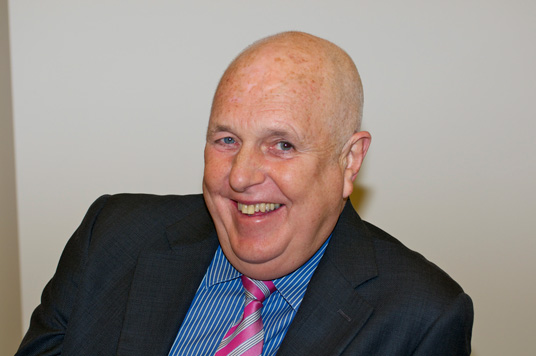A Tale of Four Prostates
There was a time when doctors were reluctant to tell patients the truth about a diagnosis of cancer, and even more unwilling to discuss any illness from which they themselves suffered. John Anderson broke the mould last year when he made a public announcement about his newly diagnosed liver metastases, which subsequently turned out to be the result of secondary spread of adenocarcinoma of the prostate.
John was President Elect of the British Association of Urological Surgeons (BAUS) at the time, so sadly had to resign his presidency (the best president we never had!) and subsequently his trusteeship of the Prostate Cancer UK charity. John’s energy and drive are legendary, he is a true surgeon’s surgeon. The stoicism and determination that he has displayed throughout a year in which he has received hormonal treatment, followed by chemotherapy, is awe-inspiring.
My admiration for John, in addition to my own recent diagnosis of localised prostate cancer, requiring robot-assisted radical prostatectomy (https://moreintelligentlife.co.uk/content/ideas/simon-garfield/prof-roger-kirby) led me to approach Sean Vesey and Damian Hanbury, whom I knew were similarly afflicted by a disease that carries a 1 in 9 lifetime risk. It occurred to me that there was a great deal to be gained from frank disclosure and discussion, as opposed to treating this problem as some dark, furtive secret. Women suffering from breast cancer are generally much more open about their problem and consequently receive much more support from friends, relatives and others who have been touched by the disease. This empowers them to make the difficult but smarter choices about their health by opting in to breast cancer treatment. Men need this kind of social encouragement and support so that we can be within reach to them as well.
The result was a publication entitled “a Tale of Four Prostates” in the upcoming issue of Trends in Urology and Men’s Health (www.trendsinurology.com) and a short accompanying video.
In this John, Damian and myself discuss the impact of our respective diagnoses and treatment. We sincerely hope that, by being frank, honest and transparent about our own situation, we can help other patients to help themselves by seeking advice and treatment earlier, and by sharing information about their diagnosis with others in order to mobilize support from their family and friends.
Sadly, John Anderson has since died. You can read an obituary by Roger Kirby here.
Comments on this blog are now closed.





Readers should also check out this link: https://www.itv.com/news/calendar/update/2013-03-20/top-prostate-cancer-doctor-gets-prostate-cancer/. In it John gives an interview on ITV news that tells his story and is raises awareness about the value of early detection of prostate cancer.
What an honest and moving piece. There has been much UK and international interest in this and it is well deserved. A unique moment of true openness that will inspire many.
A wonderful piece of writing from four brave colleagues. Thanks for submitting it to the BJUI.
Perhaps in 2013 it is not just PSA in isolation but a DRE and 3T scan if appropriate. The other new Biomarkers have failed to get the “area under the curve” quite where we would like and still need to be combined with PSA to improve diagnostic accuracy. I am told that higher resolution MRI and real time cellular imaging are not far away.
What a wonderful video: I found it absolutely riveting!
A great piece and I completely agree with the comments about openness. As my dad and uncle died aged 63 of aggressive prostate cancer, we looked for it in me and my brothers. Age 48, I had a radical prostatectomy 6 weeks ago (Gleason 3+4), making me the 5th man in this group – urologists with prostate cancer. I also adopted a ‘let’s talk about it’ approach, including giving a presentation about me as case of the week in our weekly academic meeting at Guy’s. I do feel we have a unique perspective as urologists going through this process, and must learn from it about our approach to patient care. Hopefully by talking very freely about the diagnosis, the surgery and it’s consequences, we will allow our patients to talk about their concerns and encourage discussion.
The current month’s debate about the diagnosis of prostate cancer is raging on both sides of the Atlantic. While 50,000 new cases are diagnosed in the US anually and the death rate has fallen every year since the late 1990s, the issue of PSA to identify men with this often fatal disease continues. In 2013, as many as 1/3 of men diagnosed in our department are followed with watchful waiting and many are treated with minimally invasive therapy. While there is a debate about the treatment of cancer of the prostate, we should not withhold diagnosis to provide the patient and his physician an opportuninty to discuss the best managment stratagy.
Most of us would have read a touching story by a patient, either on their blog or in the news paper. However, the stories that affect the ones within your fraternity is even more touching and makes us realise that we are indeed mortals. There are several studies that have consistently shown that physicians are reluctant to seek medical help mainly due to reluctance to discuss openly (https://www.mja.com.au/journal/2004/181/7/doctors-do-not-adequately-look-after-their-own-physical-health).
I am sure reading this blog and the video by John Anderson, many Urologists across the globe aged above 50 would at least consider testing their own PSA. On the other hand, if there is a strong family history as was the case of Jonathan Glass, getting your PSA performed beforehand is what is required.
The Urological community should thank these ambassadors for coming forward with their stories and “leading by example”when it comes to PSA and Prostate Cancer.
It’s rare to see doctors talking about their own health. It’s even rarer to see five of them talking about being treated for a cancer they spent their carrier treating!
Most inspiring and admirable was for all 5 to come forward and stoically share with the public some rather pretty private details about their health!
A unique aspect is how to approach breaking the news to family and having to bear the burden of being a doctor and a patient at the same time!
Thanks for the comment and the disclosure Jonathan. This blog should now be “a tale of five prostates”. An excellent article, by a better author than me, appears in today’s Observer: https://www.guardian.co.uk/society/2013/mar/31/surviving-prostate-cancer which highlights many of the issues surrounding the early detection of prostate cancer. Also please go to http://www.trendsinurology.com and make a comment on the PSA debate blog that we are running.
Further to my article, Ros Eeles group has confirmed my suspicion that genetically determined prostate cancer produces a more aggressive phenotype (Germline BRCA Mutations Are Associated With Higher Risk of Nodal Involvement, Distant Metastasis, and Poor Survival Outcomes in Prostate Cancer JCO.2012.43.1882). I commented on this in my article. It re-enforces the need to look for and treat aggressively prostate cancer in patients where the family history is strong and relatives have died young.
John – we miss you!
As many of you will know, very sadly John Anderson passed away on Bank Holiday Monday.
He will be sadly missed. He was not only a fine, internationally recognised uro-oncologist and a brilliant surgeon, he was also inspirationally brave in the way he handled his diagnosis of metastatic prostate cancer. His participation in the publication entitled “a Tale of Four Prostates” in a recent issue of Trends in Urology and Men’s Health (http://www.trendsinurology.com) and a short accompanying video helped to raise awareness of prostate cancer and led to a piece in the Daily Mail that has been widely acclaimed. He also recorded a touching interview for ITV about his diagnosis which I commend to you. He was the finest of men. Our most sincere condolences go to Sarah Anderson and all of John’s family.